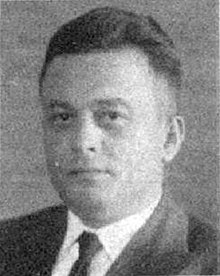Willy Marschler
Willy Marschler (born August 12, 1893 in Liegnitz ; † November 8, 1952 in Karlsruhe ) was a German politician ( NSDAP ) in Thuringia .
Life
Marschler was born the son of a mill owner. From 1900 to 1907 he attended elementary schools in Liegnitz and Plauen . He then did a commercial apprenticeship for three years and then worked as a commercial clerk until 1914. From 1914 to 1918 he participated in the First World War in part and was from 1919 until 1923 when a clerk and ironmonger in Halle and Ilmenau -employed. In addition, from 1919 he was active in the German National Handicrafts Association and in the Bühnenvolksbund on an honorary basis.
In November 1922, Marschler joined the National Socialist German Workers' Party and became a member of the Ilmenau local group, which Fritz Sauckel led from 1923 . On February 10, 1924, Marschler was elected to the Landtag of Thuringia , initially as a member of the DVFB (German-Völkische Freiheitsbewegung). He belonged to the state parliament as a member of the NSDAP faction until it was dissolved on October 14, 1933 . After the ban on membership was lifted, he rejoined the NSDAP on December 7, 1925 (membership number 24216). From January 23, 1930 until his resignation, after a successful motion of censure by the SPD on April 1, 1931, he was a member of the Weimar government without a portfolio of the Baum-Frick government . In addition, he held the honorary office of authorized representative for Thuringia for the non-profit corporation for salaried homes in Berlin .
After the election victory of the NSDAP to VI. Thuringian Landtag , Marschler became Minister of State for Finance and Economics on August 26, 1932 in a state government with Fritz Sauckel as Chairman of the State Ministry, before he succeeded Sauckel as Prime Minister on May 8, 1933. He remained Minister of Finance and Economics and after Fritz Wächtler left the company in January 1936, he was also appointed Minister of Education. The real power in Thuringia was retained as the new Reich Governor Sauckel, to whom the Prime Minister was responsible and who had to confirm the laws passed by the state government. In addition, Marschler was mayor of Ohrdruf from 1931 to 1932 and a member of the Reichstag from November 1933. In 1937, at Sauckel's request, he was made a member of the board of the Nietzsche Archive Foundation . In 1940 he was appointed head of the Thuringia regional office for the four-year plan and in 1943 SA- Obergruppenführer. Marschler was awarded the Golden Party Badge and the Silver Gauadler .
The Rhön Plan of the Main Franconian Gauleiter Otto Hellmuth led to the creation of his own Rhön Plan, often referred to as the "Marschler Plan", and to an intra-party conflict that escalated to the highest party court of the NSDAP and was only ended on the instructions of Adolf Hitler. In contrast to Hellmuth's Rhön Plan, the Marschler Plan did not provide for any race-biological examinations of the population and no resettlements, but only agricultural and infrastructural improvement measures, based on the emergency work carried out before 1933.
On May 30, 1945, the US Army captured Marschler in Gera . This was followed by an internment and due to serious illness on 10 October 1946, the parole from a detention center in Darmstadt . In 1948/49 he was convicted by a Bavarian court. After a stay in Dortmund , he lived in Ermershausen until January 1950 . He then moved to Karlsruhe, where he worked in his wife's shop.
literature
- Ernst Klee : The dictionary of persons on the Third Reich . Who was what before and after 1945 . 2nd Edition. Fischer-Taschenbuch-Verlag, Frankfurt am Main 2007, ISBN 978-3-596-16048-8 .
- Joachim S. Hohmann: Country folk under the swastika. Agricultural and race policy in the Rhön. A contribution to the regional history of Bavaria, Hesse and Thuringia . 1992, ISBN 3-631-45093-1 .
Web links
- Literature by and about Willy Marschler in the catalog of the German National Library
- Willy Marschler in the database of members of the Reichstag
- Willy Marschler in the online version of the Reich Chancellery Edition Files. Weimar Republic
- http://www.rhoen.info/
Individual evidence
- ↑ a b c d e f Bernhard Post, Volker Wahl (Ed.): Thuringia Handbook. Territory, constitution, parliament, government and administration in Thuringia 1920 to 1995 (= publications from Thuringian state archives; 1). Weimar 1999, ISBN 3-7400-0962-4 , p. 607.
| personal data | |
|---|---|
| SURNAME | Marschler, Willy |
| BRIEF DESCRIPTION | German politician (NSDAP), MdR |
| DATE OF BIRTH | August 12, 1893 |
| PLACE OF BIRTH | Liegnitz |
| DATE OF DEATH | November 8, 1952 |
| Place of death | Karlsruhe |

